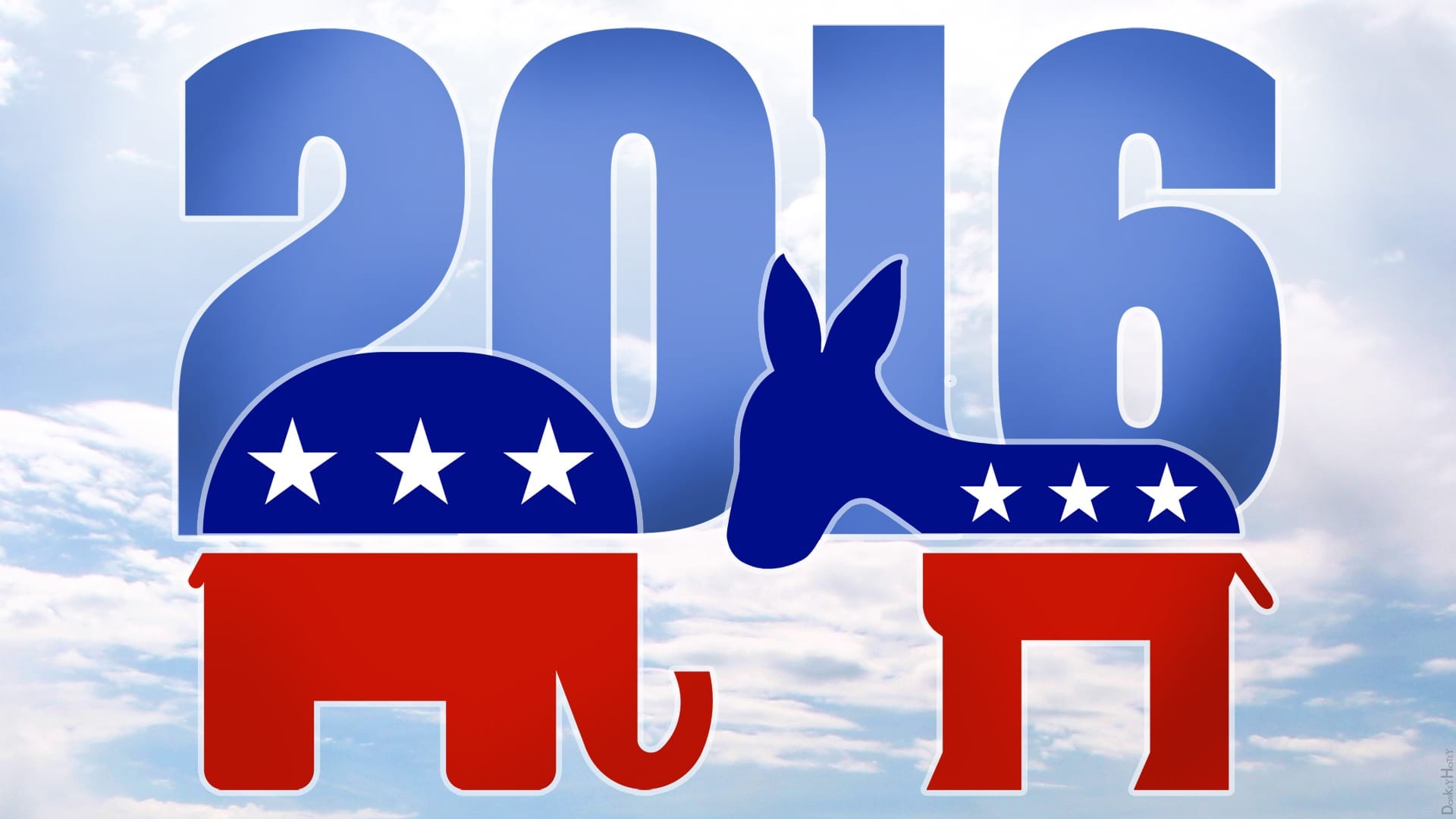Clinton vs. Trump: Health Insurance and The Affordable Care Act
In the fourth part of a five-part series analyzing each Presidential candidate’s policies, Samantha Lindsay dissects Hillary Rodham Clinton and Donald J. Trump’s stance on health insurance and The Affordable Care Act.

https://www.flickr.com/photos/donkeyhotey/24101702220/in/photolist-CHMwo1-JJBqbo-JfqXJj-HtipDo-EmeBfD-q2LvvN-4EjNgb-hmzdu9-pFhzks-q4cpTN-rfqjvv-qb6LLi-q4cTcY-hFgVz7-hFhnAV-HPBQTn-fw4bh2-qXV8Bc-H9ycLj-j4Mzc2-qTskgB-DGFjYr-jc1Ah1-DdGiqr-E7VzQR-qFKZcy-pvL18H-aK7mXD-E7VA8z-CKwfkh-rMrUHE-rBeoWw-dhh6C5-rPZNZd-s7s6xE-dfrMXk-DuGv5d-DajVcb-fw4bfZ-GfbhE9-q3yPGu-oykALh-HV12FW-qb5h4H-CKwgN7-EfaRhe-jP8E6c-nWr2DW-DUbqVj-rQ8WnK
Written by Samantha Lindsay
The following report is the fourth in a five-part series presenting a comparative analysis of select legislative proposals presented by the two major candidates in the 2016 presidential election; Democrat (D) Hillary Rodham Clinton and Republican (R), Donald J. Trump. The third article in this series presents a synopsis of the candidates’ platforms on the issue of gun control, including their similarities and differences. In this report, I will address the candidates’ positions on the issue of health insurance; specifically, the Affordable Care Act (ACA), commonly referred to as “Obamacare.” I will also outline the major objections to their individual proposals. This series is not an endorsement of either candidate.
The U.S. Department of Health and Human Services (HHS), explains, “The Affordable Care Act was passed by Congress and then signed into law by the President on March 23, 2010.” The law contains provisions that are to take effect over a period of twelve years, from the signing of the law in 2010 through the year 2022.
One of the more controversial provisions of ACA has been the individual mandate, which requires nearly everyone to have health care coverage under penalty of law enforced by the IRS. According to one poll conducted by Survey Sampling International and commissioned by The Morning Consult, 82% of Republicans, 43% of Democrats and 63% of Independents opposed the individual mandate. An ACA fact sheet published by FindLaw explains the provision and how it has been phased in over time saying, “If you refuse to get coverage, you will be charged a penalty…This fee increases each year (totaling 2.5 percent of your annual income or $695 in 2016, whichever is higher).”
While the individual mandate has been an unpopular provision of the law, it has created a public incentive for more Americans to purchase health insurance. Additionally, ACA has placed restrictions on the private sector industry and broadened public sector programs such as Medicaid and Medicare. These measures have made it easier for people seeking health insurance to qualify for coverage. This approach has led to a huge increase in the number of Americans now covered, and according to data collected by the U.S. Census Bureau, approximately 90% of Americans under the age of 65 now have some form of health insurance.
In the ACA program, private sector insurance providers participate in state-by-state marketplace exchanges found on healthcare.gov. They are rated bronze, silver, gold or platinum based on the cost of monthly premiums (how much you pay every month for coverage) and health care deductibles (how much you pay out of pocket for health care). Insurance providers who participate in the exchanges are prohibited from denying coverage or charging higher premiums for people with pre-existing conditions. Therefore, if a provider chooses to charge higher premiums to cover the cost of pre-existing conditions, they must charge the same premium to all consumers in the same exchange category.
Higher premiums make their products less attractive to healthier potential customers which has created an imbalanced risk-pool in the ACA program costing some providers, such as Aetna, hundreds of millions of dollars in losses, as explained by CNN’s Tami Luhby. According to Zachary Tracer of Bloomberg Businessweek, this dilemma created by ACA has cost the insurance industry as a whole “almost $2 billion in losses this year.”
The cost of remaining in the public exchanges has led numerous insurance providers, such as “UnitedHealthcare, the biggest health insurer in the United States,” to exit the program, as reported by Paul R. La Monica, also of CNN. Due to insurance providers leaving the exchanges, many uninsured consumers will have fewer options in the coming year. Trevor Hunnicutt reporting for Reuters states that “Nearly a third of U.S. counties likely will be served by only one insurer that participates in an Affordable Care Act (ACA) Marketplace in 2017.”
At the same time, 2017 projections reported by HHS on October 24, indicate that mid-level or “benchmark” premiums are expected to go up by an average of 25% nationwide. HHS estimates further suggest that the increase will be much higher in several states. For example, the “average second-lowest cost Silver premium for a 27-Year-Old” will increase by 116% in Arizona, 69% in Oklahoma and 63% in Tennessee.
According to a November 2nd Rasmussen poll, “Only 27% of all voters rate the health care law as a success. Thirty-nine percent (39%) still see it as a failure, while 32% rank it as somewhere in between the two.” While the Rasmussen poll found that only 4% of voters “want to leave the law as it is,” public opinion is divided primarily along partisan lines on how best to address these issues going forward. Rasmussen also found that “Seventy percent (70%) of voters say the health care law is important to their vote in the presidential election.”
(R) Donald J. Trump
Trump’s platform includes a list of legislative proposals that would potentially give a broader range of choices to all Americans and alleviate the financial burdens of the individual mandate and rising monthly premiums on health insurance. The platform begins with a promise that, “On day one of the Trump Administration, we will ask Congress to immediately deliver a full repeal of Obamacare.” A full repeal of ACA would eliminate the individual mandate that is currently enforced by the IRS; thereby, making the purchase of health insurance a choice, rather than a legal requirement.
Trump further suggests that our elected representatives “Modify existing law that inhibits the sale of health insurance across state lines.” The rationale for the proposal to open national competition to insurance providers is that it would provide Americans with greater flexibility and more choices while potentially resulting in lower monthly premiums for the consumer. According to the Rasmussen poll cited above, “Sixty-six percent (66%) of voters favor Trump’s proposal to allow employers and individuals to buy health insurance across state lines.”
Objections
While the majority of voters may support a repeal of the individual mandate, there are many provisions of ACA that have gained broad public support. According to a March 2014 Kaiser Health Tracking Poll, 70% of the public, including, “74% of Democrats, 70% of Independents and 69% of Republicans,” support the guaranteed issue provision that prohibits insurers from denying coverage to people with pre-existing conditions. A full repeal of ACA might leave many people with pre-existing conditions uninsured while forcing others to pay higher monthly premiums.
Additionally, allowing insurance companies to compete across state lines carries a risk that major insurance providers would begin to consolidate by buying out smaller insurance companies, following a pattern established by other national industries. Such a move would minimize consumer choice at the national level and possibly create an insurance monopoly. If that happened on the heels of a full repeal of ACA, there is a possibility that it would enable insurance companies to indiscriminately charge higher premiums while barring access to the most disadvantaged consumers.
(D) Hillary Rodham Clinton
Clinton’s platform includes proposals intended to address the issues of availability and cost within the framework of existing provisions of the ACA.
To make health insurance more broadly available, Clinton pledges to “work with governors to expand Medicaid in every state.” Additionally, the proposed legislation would allow “families to buy health insurance on the Health Exchanges regardless of their immigration status.” Together with the law that prohibits insurance providers from denying access to people with pre-existing conditions, these two proposals have the potential of making access to health insurance available to everyone living in the United States.
According to the Rasmussen poll cited above, 51% of voters including Republicans, Democrats and Independents, “still think Congress should go through the law piece-by-piece and improve it.” Clinton’s platform reflects the will of the majority of voters and promises to address the issues, “by strengthening, improving and building on the Affordable Care Act to cover more Americans.”
Addressing the cost of monthly premiums, Clinton proposes to give the HHS oversight authority to regulate premium rate increases. The legislation would also place a cap on the consumer’s out-of-pocket expenses for prescription drug costs, and further reduce the cost of deductibles by expanding the health care services that are covered by the health insurance industry.
Objections
While the majority of voters may prefer the type of piece-by-piece approach to improving the law that is taken by Clinton, there is nothing in the candidate’s platform that addresses the most contentious issue of the law; specifically, the individual mandate. One criticism of the ACA is that it has been a legislative experiment from the start. While it is true that it has made health insurance more widely available and affordable for many Americans, mandatory participation in what many people perceive to be a failed experiment remains widely unpopular even as the cost of the program is about to increase nationwide.
An expansion of Medicaid, which is a taxpayer-funded program, would necessitate an increase in taxpayer funding. Therefore, unless the cost of the program could be offset by cutting other government expenditures, it would necessitate an increase in taxation. Furthermore, while many Americans might be willing to fund an expansion of Medicaid and services provided by ACA, the issue of illegal immigration is a divisive issue that only becomes more polarizing when we consider providing taxpayer-funded services to illegal immigrants.
On the heels of a particularly contentious election cycle fraught with scandal, the new president may find such a proposal to be less than appealing to the majority of the American people. Additionally, while it is true that the privately owned insurance companies that participate in the exchanges sell their services directly to individual consumers, providers that participate in the exchanges are also subsidized by the taxpayer. Nevertheless, in spite of government subsidies intended to offset industry losses, the ACA has already proven to be too costly for many insurance providers. This cost burden may only increase for both the insurance industry and the American taxpayer after adding millions of currently undocumented workers to the risk-pool.
Finally, while it may be a good idea within the framework of ACA to give a government agency oversight authority to regulate premium rate increases to keep the cost of monthly premiums down, it may also result in greater financial losses for the insurance industry. Regulating the cost of monthly premiums and out-of-pocket deductibles would potentially place a greater burden on the private sector health insurance industry to finance the cost of healthcare while decreasing their profit incentive to do so. As is currently the case with many providers, if the insurance industry continues to lose money, they will become increasingly unwilling to participate in the public exchanges. As insurance providers leave the public exchanges Americans, who are required by law to have health insurance, are left with fewer choices regarding where they may obtain it.
Edited by Ben Webb
Featured image by DonkeyHotey on Flickr, obtained using creativecommons.org



